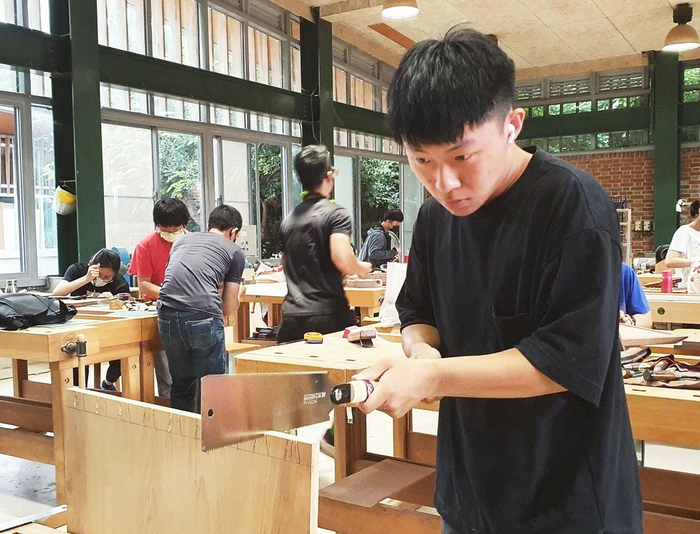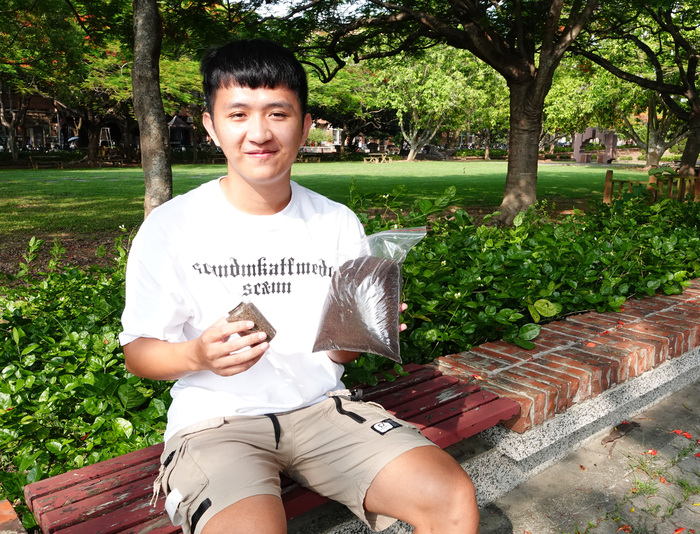Nurtured With a “Worm” Heart, National Chung Cheng University Students Created Fertilizer With Organic Sub-Materials


In Taiwan, the main ways to deal with organic sub-materials are either by burying them in landfills or burning them in incinerators, both of which will create an immense burden on the globe. In order to invent a sustainable way to dispose of the materials, CCU Startup Land Team Hidden Worm Sneaky Fungus turned organic sub-materials into humus products, with the help of earthworms and microbes. This act then created the organic fertilizer Hyper-Nutritious Earthworm Manure. The process of making the fertilizer successfully dealt with the organic sub-materials in an eco-friendly way and helped improve the agricultural sphere.
Hidden Worm Sneaky Fungus is a team consisting of members from CCU Department of Earth and Environmental Sciences and Department of Mechanical Engineering, NYUST Department of Information Management and CCU College of Science Dean Chien-Yen Chen. The team analyzes natural decomposers in the environment, such as earthworms, mealworms and microbes. By examining their living conditions and surviving criteria, the team can then produce high-quality organic fertilizer. The team’s organizer Chin-Wen Wang said, for large organic particulate matter to be turned into nutritious fertilizer, it first need to be processed by earthworms and microbes. After the procedure, the team can then create sustainable and ecological fertilizer for all to use.
“It is unfortunate how much the soil has changed compared to the old times.” Said Chin-Wen Wang. “I hope to revitalize the soil and make it just as nutritious as it was in the past.” The inspiration came to him when he was watching the TV program Beautiful Taiwan. An earthworm expert called Chao-An Li was interviewed on the show. The man used his expertise for earthworms to change the environment for the better. Li’s passion soon then influenced Chin-Wen Wang, which even led him to go find Li himself and asked to be under his teaching. In the early stages of the fertilizer’s development, Wang even stank up the entire research room with dried chicken manure, for he was trying to make a batch of earthworm compost. After this incident, Wang discussed his plans with Chien-Yen Chen and other team members. They then slowly constructed the prototype of the Hyper-Nutritious Earthworm Manure.
Chin-Wen Wang said: “If you want to keep a worm healthy, you must become a worm yourself and truly get into the mindset of a worm.” The main characteristic of earthworms is their pickiness for the environment. They would rather be sunburned to death than live in an environment that doesn’t fit their liking. Chin-Wen Wang mentioned, in order to construct the perfect living conditions for earthworms to decompose organic sub-material, they added fungus crumbs in earthworm manure. This allows the soil to be rich in carbon sources that are crucial to creatures’ survival, while balancing the carbon-to-nitrogen ratio between manure and vegetables.
The team said, fertilizer is supposed to smell of sweet aroma under normal conditions and only fertilizer that wasn’t decomposed entirely will emit the smell of foul ammonia. Fertilizer is a crucial part of agriculture; however, many farmers don’t use organic fertilizer, for fear they use the ones that aren’t decomposed entirely and damage the soil. This is the main reason why a lot of farmers prefer chemical fertilizer. The team pointed out, even though chemical fertilizer can ensure plants’ growth, the damage done to the soil and creatures will have significant consequences. Using chemical fertilizer will cause the soil to harden, therefore making it impossible to plant any crop.
Hidden Worm Sneaky Fungus had run multiple scientific tests to understand various kinds of element ratio and microbe diversity among sub-materials. The team also worked with NYUST Department of Information Management regarding statistical research and produced fertilizer that can cater to plants’ living conditions. In Chiayi, the main crops being planted are pineapples, lychees and sugar canes. Chin-Wen Wang said, this year, they will focus on researching fertilizer that is suitable for plants growing in Chiayi. With the help of earthworms, they’ve gained the ability to customize their fertilizer to accommodate various kinds of crops. The team hopes to utilize their product and change the agriculture world for the better.

